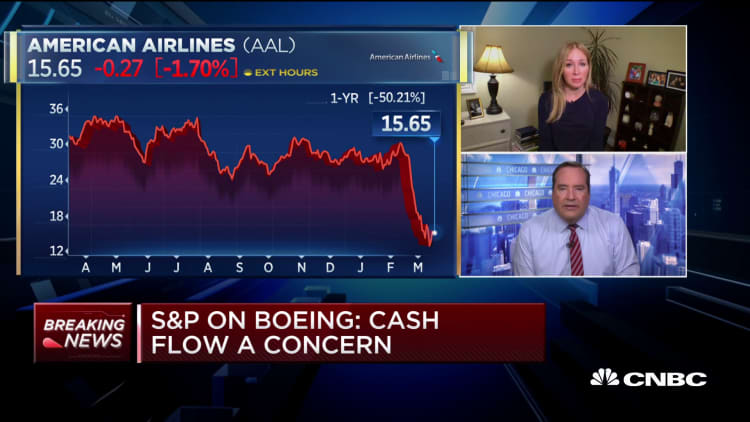Travel deals are emerging amid the chaos of the global coronavirus outbreak. Many people are probably wondering if now is the right time to buy, whether for an out-of-town jaunt or a big summer vacation.
The short answer is that it's not worth it right now, according to experts. Travelers should hold off on making plans given the extremely fluid situation, they say.
"I know it's awesome to be able to get a great sale on a destination you've always wanted to go to," said Sara Rathner, a travel expert at NerdWallet. "But it's a risk. Wait as long as you can."
The coronavirus, which emerged in China late last year, has infected more than 183,000 around the world and killed more than 7,100.
The disease has had a dramatic impact on the travel industry. Airlines, hotel operators and others catering to tourists and business travelers have seen consumer demand evaporate, amid fear or necessity as governments have restricted travel to reduce the disease's spread.
To that point, 55% of American travelers have canceled travel plans, according to Destination Analysts, a tourism market research firm. Those trips have primarily been in the short term, through May.

Many airlines are trying to spur demand by reducing prices along the travel value chain, experts said.
There has been a 12% average decrease in airfare and a 6% to 7% average price reduction for train and bus travel over the past week due to the coronavirus, according to Boris Radke, the director of corporate affairs at Omio, a travel booking site that works with about 800 travel providers.
For example, a round-trip flight from New York to New Orleans runs as low as $66 today. The same flight would have cost $302 around 40 days ago, according to Google Flights.
It's this ever-changing thing. We don't know how things will progress into June, July and beyond.Sara Rathnertravel expert at NerdWallet
A round-trip flight from New York to Reykjavik, Iceland's capital, now costs as little as $346 for a July departure. That's about $200 less than it was a month and a half ago, according to Google.
Before Italy announced a countrywide lockdown, luxury hotels in Rome were advertising rooms for around $50 to $70 a night, said Gabe Saglie, a senior editor at website Travelzoo.
"As early as a week ago, we were seeing some drastic fare-slashing going on and hotel price drops," Saglie said.
Resist the urge
Despite these deals, there's "no question" Americans should avoid travel for at least the next two months — and likely the next three to four months, said Radke at Omio.
Tempering the urge to buy could save consumers a lot of frustration — and money — down the road.
That's because major airlines, for example, are slashing their domestic and international flight capacities, many by more than half, through May.
The situation remains fluid, making it impossible to know whether a flight booked today will be available in a few weeks or months — or whether the airline will even still be solvent, Radke said.
"It's this ever-changing thing," said Rathner of NerdWallet. "We don't know how things will progress into June, July and beyond."

Countries and cities also may announce new travel policies or shut down daily life and cultural destination access to an unprecedented degree by the time a trip comes around, diminishing the allure of visiting a particular place.
Traveling could also put individuals' health at risk. Officials and government agencies have urged social distancing to prevent the spread of the coronavirus, and it's impossible to say how long it will take for the virus to run its course.
President Trump suggested yesterday the crisis could extend into July or August.
"Fall could sort of become the new summer in terms of people having the willingness, time and wherewithal to get to traveling again," said Saglie at Travelzoo.
Travel insurance
It also might not be the most prudent time to book a trip, given the economy looks increasingly likely to be heading toward recession and Americans will want more cash on hand to manage any potential financial fallout, experts said.
Americans compelled to book a trip now should be prepared to do their financial homework. That means reviewing fee policies for the airlines and hotels in a desired location, Rathner said.
Some websites are trying to make this easier. Kayak, for example, is adding a filter to show which providers offer free cancellations (in the form of travel credits) and those waiving their change or cancellation fees, according to a spokeswoman.
More from Personal Finance
States call for federal delay to 'Real ID' use at airports
FIRE fans see opportunity as market lurches
Coronavirus may drive more students to in-state public colleges
Americans should also consider travel insurance, experts said.
"Cancel for any reason" coverage can be expensive, but is likely worthwhile to recoup most of the cost of a big, once-in-a-lifetime trip costing several thousand dollars, Rathner said.
This type of coverage probably isn't cost-effective for a cheaper domestic trip, so travelers should be prepared to eat most costs for canceled travel, she said.
"I think once this thing is over, travel will go through the roof," Radke said. "People will have such a lust of going out there to travel and see the world."


